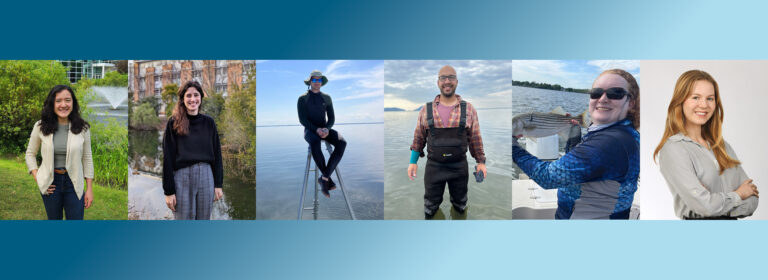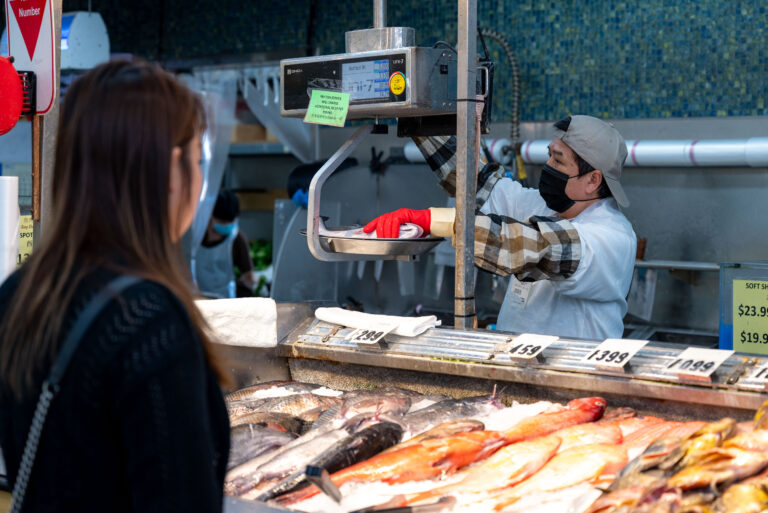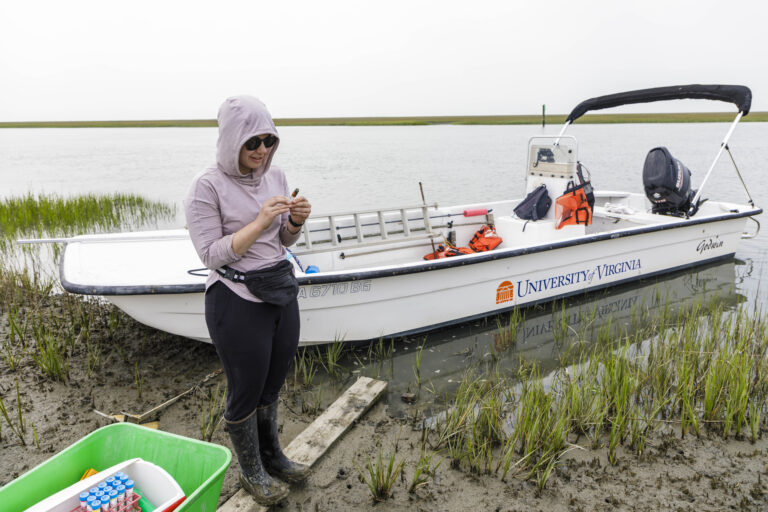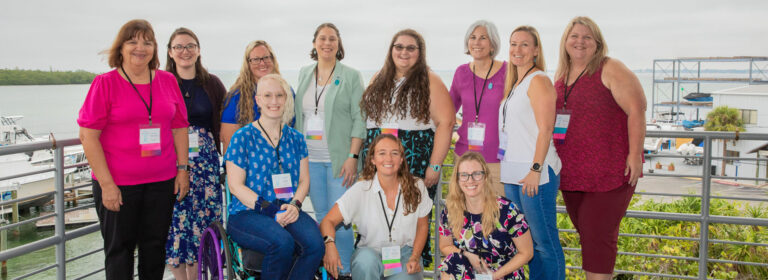Knauss fellow spends ‘whirlwind’ year on the Hill crafting tornado policy
As a native of Virginia’s Eastern Shore, Victoria Long Rubin remembers the tornado that touched down on the Eastern Shore in 2014. At the time, Long Rubin was a college student at University of Virginia studying environmental science. Fast forward to 2021, she was writing the TORNADO Act — legislation to improve tornado forecasting and research as a Knauss Marine Policy Fellow.
“Here I am just a few years later working on something that might have had an impact on my own community,’” Long Rubin said. “That was my big piece of legislation that I wrote. It was cool to come full circle on that.”
As a Knauss Fellow, Long Rubin spent a year as a minority staff member for the Senate Oceans, Fisheries, Climate Change and Manufacturing Subcommittee, which is part of the larger Commerce, Science and Transportation Committee. For the most part, she focused on topics related to the National Oceanic and Atmospheric Administration (NOAA) — everything from salmon research to satellites and severe weather alerts.
“I got to learn the insides and outsides of NOAA pretty quickly,” she said.
How does legislation get its start?
In the case of Long Rubin’s TORNADO Act, the legislation stemmed from tornado outbreaks in May and December 2021 that caught portions of the southeastern United States unprepared. These events highlighted a need for better forecasting and emergency communication — especially as “tornado alley” expands to include more regions where hills and forest cover could hide a tornado nearby.
“We’re seeing that people don’t always know when we’re issuing a severe warning, because sometimes the language is so similar, they just assume a tornado might touch down a few miles away,” Long Rubin said. “They don’t realize that this tornado’s going to be on the ground for almost 100 miles, and they’re right in the middle.”
Before writing the TORNADO Act, staff members like Long Rubin run the idea for their legislation by experts and look through existing legislation to see where their bill could fill in the gaps. After Long Rubin prepared the initial draft and polished the language, she shared it back with legal experts to ensure the bill’s language was technically sound, and with NOAA to ensure the agency could carry out the bill’s objectives if it passed.
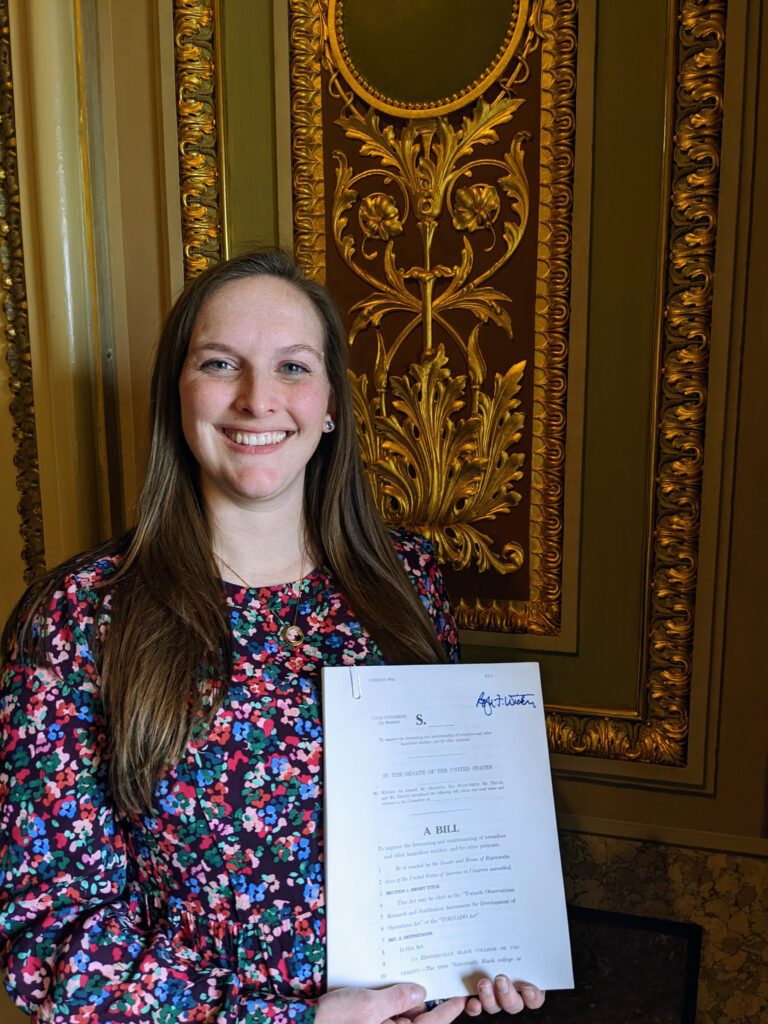
“Typically, you’re hoping that you’ve put together a really good piece of legislation that is concise and specific so that you worked out any problems behind the scenes,” Long Rubin said.
Long Rubin also saw how some of the policy she worked on played out at the local level during a weeklong trip to Mississippi.
In this process, Long Rubin’s day-to-day work involved a lot of writing — mostly for memos that summarize research and legislation. She also spent time in meetings discussing improvements to proposed bills or bringing legislation to senators’ offices to get their support. For the TORNADO Act, that meant reaching out to the senators in states affected by the tornado outbreaks.
“Typically, you’re hoping that you’ve put together a really good piece of legislation that is concise and specific so that you worked out any problems behind the scenes and it’s a clean, uneventful markup that is reported out of the committee,” Long Rubin said.
Even so, a “quickly” passed bill can still take a year or two to become law. Even though her Knauss Fellowship has concluded, Long Rubin will still be working on the TORNADO Act in her new role as a professional staff member for the Senate Commerce Committee’s Subcommittee on Space and Science.
“My role will be switching from oceans and weather to science, education, and research,” Long Rubin said. “For the most part, I’ll be working on policy that affects National Science Foundation programs.”
Visiting the sites where policy plays out
During her fellowship, Long Rubin also tracked initiatives such as 30 by 30, an effort to protect 30 percent of U.S. lands and ocean territories by 2030. After collaborating with Eastern Shore farmers as a graduate student at University of Virginia, Long Rubin was able to appreciate how community buy-in for science could help initiatives like 30 by 30 succeed.
“I had the opportunity to talk with some of the new NOAA appointees about how NOAA fits into this 30 by 30 initiative —where they saw NOAA’s role, and how that could work,” Long Rubin said.
Long Rubin also saw how some of the policy she worked on played out at the local level during a weeklong trip to Mississippi with staff from the office of Senator Wicker, who serves on the committee for Science, Transportation, and Commerce. While there, she met with the Mississippi Manufacturers Association, and visited the Mississippi Emergency Management Agency’s facility and the NOAA National Weather Service Weather Forecast Office in Jackson, which is responsible for issuing severe weather alerts for part of the Southeast.
“Overall, that trip to Mississippi was one of the highlights of my fellowship,” she said. “You can sit behind a desk, on a video call, and talk about how you want your legislation to impact Americans, and it’s another to go to the place where you’ve been prioritizing legislation for an entire year and see how these different groups are using your funding.”
Takeaways:
- As a Knauss Fellow, Long Rubin spent a year as a minority staff member for the Senate Oceans, Fisheries, Climate Change and Manufacturing Subcommittee.
- Long Rubin helped write the TORNADO Act — legislation to improve tornado forecasting and research.
- Long Rubin also saw how some of the policy she worked on played out at the local level during a weeklong trip to Mississippi with staff from the office of Senator Wicker.
Written by Madeleine Jepsen | Virginia Sea Grant
Photo by Aileen Devlin | Virginia Sea Grant
Contributed photos by Victoria Long Rubin
Published March 18, 2022.
Recent Stories:
More Student Blogs:
Many Suits:
2017 Knauss Fellow reports for Congress, meets Hurricane Hunters
2017 Virginia Sea Grant Executive Knauss Fellow Sasha Doss blogs for us about her experience in the NOAA Fisheries Office of
Mentoring Young Scientists Program
Benefits from VASG Graduate Fellow Outreach
The following blog post is by Hannah Aichelman, a Virginia Sea Grant (VASG) graduate research fellow, and a graduate student
Dip, Dig,
Crunch and Rise
Dennis Quigley is a photography intern for Virginia Sea Grant studying photography at Thomas Nelson Community College. Here, he recounts his
Exploring the
World of Policy
The following blog post is by Bethany Williams, a graduate student at the Virginia Institute of Marine Science (VIMS), and Virginia Sea

